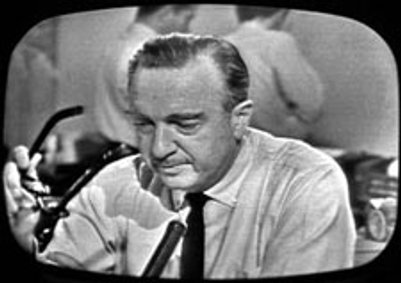
The year was 1980. I was a boy from Queens, NY, on my way towards earning a Journalism degree. Like so many other students of the Fourth Estate I had my idols. The role models whose greatness I aspired to someday emulate. I studied the work of perhaps the most famous newsman ever, Edward R. Murrow. I thought Watergate reporters Carl Bernstein and Bob Woodward were true American heroes. And I was completely awed by Walter Cronkite, who had retired from the anchor desk at CBS that same year. He was the silver-haired, staccato'd voice of reason whom everyone trusted and took very, very seriously, especially our nation's presidents.
There are many moments in Cronkite's career that will always be remembered. When he choked back tears as he announced officially the death of President John F. Kennedy, America cried with him. When the Apollo 11 spacecraft landed on the surface of the moon and astronaut Neil Armstrong stepped off, Cronkite was speechless; as awestruck as a 15-year-old meeting Miley Cyrus. And Cronkite's power and influence was never more on stage than in 1968 after he returned from Vietnam and all but said the war was a lost cause. Then-president Lyndon B. Johnson lamented, "If I've lost Cronkite, I've lost middle America."
It's hard to imagine any one journalist in today's vast maze of broadcast and print news outlets having such devastating impact on presidential politics. But Cronkite was tough, he was courageous, and he spoke the truth from his heart and his soul. Sadly, those virtues are gone from the news business today. Makes one wonder what would've happened during the George W. Bush years if the media had someone with a pair of balls like Cronkite to challenge him on Iraq, torture and Hurricane Katrina for example. Instead, the press was utterly neutered during those eight years, more concerned with preserving its White House gala invites than reporting the news in the take-down mold of Woodward and Bernstein. I'm convinced Cronkite would've single-handedly prevented Bush's second term from happening had he been back at the anchor desk.
Years after Cronkite retired he gave an interview where he spoke of the young John F. Kennedy Jr.'s salute to his father's coffin as it passed during the funeral procession after the Nov 22, 1963 assassination. Cronkite broke down, attempted to compose himself, and through tears smiled and sheepishly offered, "Anchormen aren't supposed to cry." But what Cronkite really taught us was that true leadership and inspiration doesn't come with cowboy swagger and machismo. It comes from being so in touch with the populace that your emotion, your humility, your courage and your strength becomes theirs. And that's what Walter Cronkite gave America during nineteen of the most tumultuous years in our nation's history.
Just a few short years ago I had the thrill of sitting a couple of rows behind Cronkite at several youth ice-hockey games at NYC's Chelsea Piers, where my now 17-year-old son and his grandson played for the same Cyclones team. I was much too scared to approach this living legend, and would've babbled some incoherent gibberish had I done so. But I didn't need to. It was simply enough just to be in the same room with him.
R.I.P. Walter. There will never be another like you.